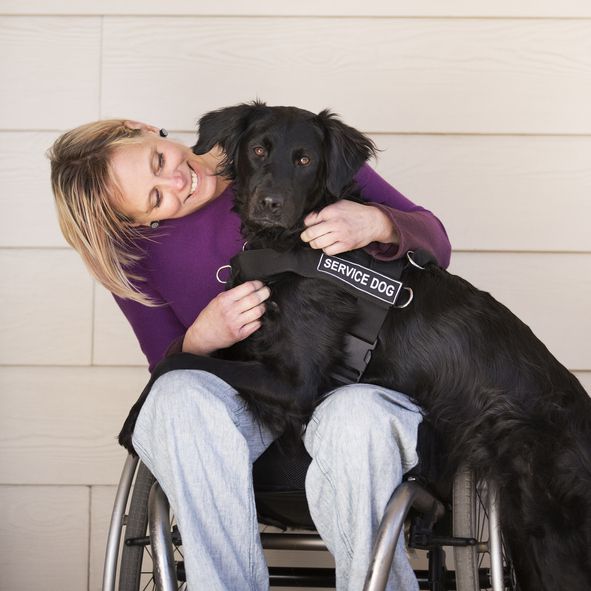Calm, cool and collected; attentive and disciplined — surely those admirably trained service dogs who assist disabled people must complete a stringent certification and registration process, right? Actually, and perhaps surprisingly, no, service dogs don’t have to be certified or registered.
Service dog regulations are codified in the Americans with Disabilities Act (ADA), which requires no certification or registration of any kind. Sure, you can pay for a certificate or a registration — plenty of private online entities are happy to sell you that piece of paper — but it carries no weight, no legal standing. The ADA states, “These documents do not convey any rights under the ADA and the Department of Justice does not recognize them as proof that the dog is a service animal.”
In fact, the ADA defines a service dog simply as “a dog that is individually trained to do work or perform tasks for an individual with a disability,” and the task (or tasks) must be directly related to the disability. Examples of service dog tasks are numerous, and a few are:
- a dog taught to retrieve emergency medication to hand when her owner needs it
- dog trained to guide a person safely across the street
- a dog taught to alert a diabetic to dangerous blood sugar levels.
The ADA definition of a service dog is concise but highly inclusive. Let’s say you’re physically impaired from being able to pick up objects off the floor, so you’ve trained your dog to retrieve those objects for you. Provided she is perfectly behaved in public, you have yourself a service dog — congratulations!
There is no official list of qualifying disabilities for engaging the aid of a service dog, and dogs are trained to assist in an extensive range of physical and psychological challenges. And when it comes to that training, yes, service dogs require both exceptional training and superb aptitude, but the ADA mandates no specific training protocol. You or a family member or a friend can train your service dog, or you can pay a professional trainer (they are ubiquitous, but given the expense, vet trainers thoroughly).
The ADA service dog definition excludes emotional support dogs, therapy dogs and companion dogs because they have not been trained to perform a task specific to the owner’s disability.
Critically, the ADA provides the legal footing for service dogs accompanying their owners in virtually all public settings and venues. The only requirements are the service dog must be fully trained and under the complete control of its handler and the dog does not need any special form of identification, such as a service dog vest. The ADA also specifies that staff at public places can ask only two questions of a service dog’s handler:
- “Is the dog a service animal required because of a disability?”
- “What work or task has the dog been trained to perform?”
Generally, a service dog can only be excluded from accompanying its human handler if the dog’s presence would “fundamentally alter the nature of a service or program provided to the public.” Some states and municipalities may allow in-training service dogs, or even emotional support dogs and therapy dogs similar leeway, so check local laws.






